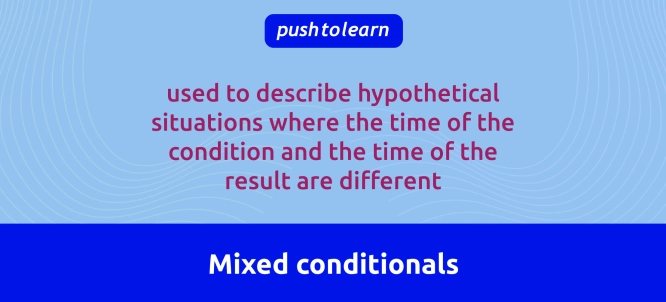by PushtoLearn
Mixed Conditionals
Table of Contents
Mixed Conditionals – Exercises
These exercises focus on Mixed Conditionals
What Are Mixed Conditionals?
Mixed conditionals combine elements from second and third conditionals. They are used when the condition and the result refer to different times:
-
Second Conditional describes hypothetical situations in the present or future.
-
Third Conditional describes hypothetical situations in the past.
By mixing these, you can:
-
Imagine how a past action affects the present.
-
Imagine how a present condition could have changed the past.

Types of Mixed Conditionals
Type 1: Past Condition → Present Result
This structure describes how a hypothetical past action or event affects the present.
Form:
-
If + past perfect, would + base verb
Examples:
-
If I had studied harder, I would have a better job now.
-
If she had left earlier, she would be here by now.
Explanation:
-
The condition (If I had studied harder) refers to the past.
-
The result (I would have a better job now) refers to the present.
Type 2: Present Condition → Past Result
This structure describes how a hypothetical present situation could have changed something in the past.
Form:
-
If + past simple, would have + past participle
Examples:
-
If I were taller, I would have joined the basketball team last year.
-
If she were more organized, she wouldn’t have missed the deadline.
Explanation:
-
The condition (If I were taller) refers to the present.
-
The result (I would have joined the basketball team last year) refers to the past.
Key Differences Between Mixed and Standard Conditionals
|
Aspect |
Mixed Conditionals |
Standard Conditionals |
|
Time frames |
Condition and result refer to different times. |
Condition and result refer to the same time. |
|
Complexity |
More flexible for expressing detailed ideas. |
Simpler, focusing on one time frame. |
|
Example |
If he had studied, he would be successful now. |
If he had studied, he would have passed. |
Common Errors and How to Avoid Them
|
Error |
Why It’s Wrong |
Correct Example |
|
Mixing incorrect structures |
Using the same tense for both parts. |
Incorrect: If I studied, I would have a better job now. |
|
Forgetting the time relationship |
Misplacing past and present references. |
Incorrect: If I have money, I would have traveled last year. |
|
Overusing mixed conditionals |
Not all hypothetical situations need them. |
Use simpler conditionals when time isn’t a factor. |
Everyday Use Examples
Conversation 1: Regret About the Past, Current Impact
-
A: Why didn’t you learn Spanish in school?
-
B: If I had learned Spanish, I would be able to work in Spain now.
Conversation 2: Imagining a Different Present, Changing the Past
-
A: I didn’t win the competition last year.
-
B: If you were more confident, you would have performed better.
FAQ
When should I use mixed conditionals?
Use mixed conditionals when the time of the condition (if-clause) and the result are different.
Can I use other modal verbs in mixed conditionals?
Yes! For example: If she had studied harder, she might be more confident now.
Are mixed conditionals formal or informal?
They can be used in both formal and informal contexts.
What’s the difference between second, third, and mixed conditionals?
-
Second: Hypothetical present/future situations.
-
Third: Hypothetical past situations.
-
Mixed: Combines these for different time frames.
Can I use contractions in mixed conditionals?
Yes! For example: If I’d studied more, I’d have a better job now.

